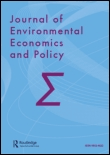
Journal of Environmental Economics and Policy
Scope & Guideline
Bridging the Gap between Environmental Challenges and Economic Policies
Introduction
Aims and Scopes
- Environmental Valuation and Economics:
The journal focuses on the economic valuation of ecosystem services, environmental impacts, and natural resources, employing methodologies such as contingent valuation, choice experiments, and meta-analyses. - Policy Analysis and Development:
It seeks to analyze and develop economic policies that address environmental issues, including climate change, resource management, and pollution control, often exploring the effectiveness of market-based instruments. - Sustainability and Development Economics:
The journal emphasizes sustainable economic practices and their implications for development, particularly in the context of low-income and developing countries, addressing issues like energy poverty and food security. - Behavioral and Experimental Economics:
Research often explores behavioral aspects related to environmental decision-making, including willingness to pay for environmental goods and services, and the impact of nudges on pro-environmental behavior. - Interdisciplinary Approaches to Environmental Issues:
The journal encourages interdisciplinary research that combines economics with insights from ecology, sociology, and public policy, reflecting the complex nature of environmental challenges.
Trending and Emerging
- Climate Change Mitigation and Adaptation:
Recent publications emphasize the economic aspects of climate change mitigation strategies, adaptation policies, and their socio-economic implications, highlighting the urgency of addressing climate-related issues. - Market-Based Environmental Instruments:
There is a growing interest in exploring market-based instruments for environmental protection, such as carbon pricing and biodiversity credits, indicating a shift towards innovative economic solutions for sustainability. - Health and Environmental Interactions:
Research examining the links between environmental factors and public health outcomes has gained traction, reflecting the increasing recognition of the health impacts of environmental degradation and pollution. - Behavioral Insights and Environmental Decision-Making:
Emerging studies focus on behavioral economics to understand how human behavior influences environmental policy acceptance and effectiveness, indicating a trend towards integrating psychological factors into economic models. - Sustainable Resource Management:
The journal has seen an uptick in research related to sustainable management of natural resources, including water, forestry, and fisheries, reflecting a holistic approach to environmental economics.
Declining or Waning
- Traditional Environmental Kuznets Curve Studies:
Research focused on the classic Environmental Kuznets Curve (EKC) hypothesis has seen a decline, possibly due to the emergence of more nuanced approaches that consider a wider range of factors influencing environmental degradation. - Static Valuation Methods:
There appears to be a waning interest in static valuation methods for environmental goods, as researchers increasingly adopt dynamic and behavioral models that incorporate time and uncertainty in decision-making. - Sector-Specific Environmental Policies:
There has been a reduction in studies exclusively focused on sector-specific environmental policies, as broader, more integrated approaches to policy analysis gain traction.
Similar Journals

Journal of Environmental Accounting and Management
Catalyzing change through open access knowledge sharing.The Journal of Environmental Accounting and Management (ISSN: 2325-6192, E-ISSN: 2325-6206), published by L & H SCIENTIFIC PUBLISHING, LLC, serves as a vital platform for interdisciplinary discourse at the intersection of environmental science, accounting, and strategic management. With a commitment to addressing the growing complexities of ecological and management challenges in contemporary society, this journal, active from 2013 to 2024, contributes valuable insights into sustainable practices and environmental accountability. Although categorized in the lower quartiles in various fields, including Accounting and Ecology, it maintains significant rankings in Urban Studies, and is poised for growth with an emerging focus on practical implications for policy and law. Moreover, the journal's open access model ensures that research is readily available to a global audience, fostering collaboration among researchers, professionals, and students alike. As a resource that bridges theoretical frameworks with real-world applications, the Journal of Environmental Accounting and Management is positioned to inspire innovative solutions for a sustainable future.
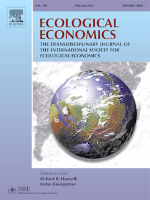
ECOLOGICAL ECONOMICS
Navigating the Complexities of Ecological and Economic Systems.ECOLOGICAL ECONOMICS, published by ELSEVIER, stands as a premier journal dedicated to the integration of ecological and economic thinking, exploring the complex interactions between human and natural systems. With an impactful history dating back to 1989, the journal has solidified its position in the academic community, evidenced by its classification in the top quartiles (Q1) of both Economics and Econometrics and Environmental Science categories for 2023. ECOLOGICAL ECONOMICS boasts impressive Scopus rankings, holding the 32nd position out of 716 in Economics and Econometrics and 19th among 233 in General Environmental Science, reflecting its substantial influence and reach. Although it does not currently offer open access options, the journal remains a vital resource for researchers, professionals, and students interested in sustainable development, environmental policy, and resource management. The ongoing convergence of various fields within ecological economics promises to yield valuable insights and foster interdisciplinary collaboration, making this journal an essential component of scholarly discourse.

Bio-based and Applied Economics
Advancing Knowledge in Bio-Based Applications and EconomicsBio-based and Applied Economics, an esteemed journal published by FIRENZE UNIV PRESS, is an open-access platform dedicated to the dissemination of innovative research and critical reviews in the interdisciplinary areas of agronomy, animal science, and food science, with a strong emphasis on the economic and environmental implications of bio-based applications. Since its inception in 2012, the journal has positioned itself as a valuable resource for academics and professionals alike, boasting a commendable Q2 ranking across various fields, including Economics, Environmental Science, and Applied Biological Sciences. With its notable impact factor and commitment to accessible research, it aims to foster knowledge exchange and stimulate advances in bio-economy practices. This journal not only contributes significantly to scholarly discourse but also serves as a crucial tool for policymakers and industry leaders seeking evidence-based solutions to contemporary challenges in sustainability and resource management.
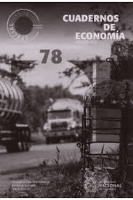
Cuadernos de Economia
Exploring innovative solutions for a dynamic society.Cuadernos de Economia, published by UNIV NAC COLOMBIA, FAC CIENCIAS ECONOMICAS, CUADERNOS ECONOMIA, stands as an open access journal dedicated to advancing the discourse in the fields of Economics, Arts and Humanities, and Social Sciences. With its ISSN 0121-4772 and E-ISSN 2248-4337, this journal has been openly accessible since 2001, facilitating the dissemination of research from diverse socioeconomic contexts, particularly in Latin America. The journal is recognized in various Scopus ranks, with notable inclusions within Q3 and Q4 quartiles for 2023, reflecting its commitment to quality scholarly publishing. Operating out of Bogotá, Colombia, Cuadernos de Economia serves as a vital resource for researchers, professionals, and students seeking to explore innovative economic solutions and multifaceted social dynamics. Through its publication, the journal aims to foster academic exchange and support the development of new ideas in the ever-evolving landscape of economics and society.

ENVIRONMENT AND DEVELOPMENT ECONOMICS
Exploring Innovative Pathways to Sustainable DevelopmentEnvironment and Development Economics, published by Cambridge University Press, stands as a pivotal journal in the fields of development economics and environmental science. With a robust ISSN of 1355-770X and an E-ISSN of 1469-4395, this esteemed publication has been a significant contributor to scholarly discourse since its inception in 1996 and continues to thrive with a convergence of research insights expected to run until 2024. Distinguished by its Q1 status in Development and its Q2 rankings in both Economics and Econometrics and Environmental Science (Miscellaneous) for 2023, the journal reflects its commitment to high-impact research. Notably, it ranks 58th out of 306 in Social Sciences Development and maintains respectable standings in other categories, emphasizing its importance in shaping policies and practices at the intersection of economics and environmental sustainability. Researchers, professionals, and students engaged in these disciplines can access this journal for thought-provoking articles that advance understanding of economic development while addressing environmental challenges.

Annual Review of Resource Economics
Advancing Insights into Resource ManagementThe Annual Review of Resource Economics is a premier journal published by Annual Reviews, focusing on the multifaceted field of economics with a particular emphasis on resource allocation, sustainability, and environmental impact. With an impressive impact factor and recognized as a Q1 journal in the 2023 category of Economics and Econometrics, it ranks in the top 90th percentile among its peers, specifically at #66 out of 716 in Scopus rankings. Since its inception in 2010, the journal has provided a vital platform for the dissemination of comprehensive reviews and critical analyses, serving as an essential resource for researchers, professionals, and students seeking to explore the dynamic intersections of economics and resource management. Its commitment to scholarly rigor without compromising accessibility makes it an indispensable asset to the academic community, contributing significantly to the discourse on resource economics in an ever-evolving global landscape. The journal does not currently offer open access, ensuring exclusive content for subscribers.
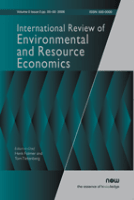
International Review of Environmental and Resource Economics
Advancing the Frontiers of Environmental EconomicsThe International Review of Environmental and Resource Economics, published by NOW PUBLISHERS INC, is a leading academic journal dedicated to advancing the understanding of environmental and resource economics. With an ISSN of 1932-1465 and an E-ISSN of 1932-1473, this journal has established itself as a crucial platform for innovative research and discussion in related fields. Covering a broad scope that integrates theoretical frameworks with practical applications, the journal has a distinguished status in the academic community, evidenced by its Q2 ranking in multiple categories including Accounting, Economics and Econometrics, and Finance for 2023. It also maintains a commitment to providing a rich reservoir of knowledge while operating without Open Access constraints, thus promoting rigorous academic exchange among researchers, professionals, and students. The journal's converged years from 2007 to 2024 reflect its ongoing relevance and importance in contemporary economic discourse, particularly in areas concerning management, monitoring, policy, and law pertaining to environmental issues.
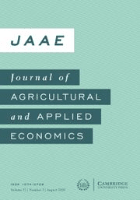
Journal of Agricultural and Applied Economics
Empowering insights in agriculture and applied economics.The Journal of Agricultural and Applied Economics, published by Cambridge University Press, stands as a leading platform for disseminating innovative research in the fields of agriculture, economics, and applied sciences. With an impressive impact factor and a prestigious Q1 ranking in Agricultural and Biological Sciences and Q2 in Economics, this journal is recognized for its rigorous peer-reviewed content that addresses contemporary challenges in agricultural and economic policies. Since its transition to Open Access in 2015, it has widened its reach, allowing scholars, practitioners, and students unrestricted access to vital research findings. The journal's scope encompasses a wide array of topics, fostering interdisciplinary dialogue and offering insights essential for informed decision-making in the agricultural sector. Addressing critical issues from food security to sustainable practices, the Journal of Agricultural and Applied Economics is instrumental for anyone seeking to contribute to the advancement of knowledge in these pivotal areas.

ENVIRONMENTAL MANAGEMENT
Innovating solutions for pressing environmental challenges.ENVIRONMENTAL MANAGEMENT, published by Springer, stands at the forefront of advancing sustainability and ecological stewardship in the fields of Ecology, Global and Planetary Change, and Pollution. With an impressive tracking history from 1977 to 2024 and prestigious quartile rankings reflecting its significant impact (Q1 in Ecology and Q2 in both Global and Planetary Change and Pollution), this journal engages a wide range of stakeholders, including researchers, policymakers, and environmental professionals. The journal is a vital resource for those dedicated to addressing pressing global environmental challenges, publishing rigorous interdisciplinary research that informs policy and practice. While it does not offer open access, its content remains accessible through institutional subscriptions. Located in the heart of New York, ENVIRONMENTAL MANAGEMENT is dedicated to fostering a substantive dialogue on innovative approaches to environmental preservation and management.
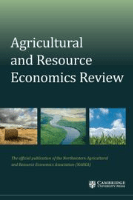
Agricultural and Resource Economics Review
Transforming Knowledge into Practice in Resource EconomicsAgricultural and Resource Economics Review is a leading peer-reviewed academic journal published by Cambridge University Press, dedicated to advancing scholarship in the fields of agricultural and resource economics. Since achieving Open Access status in 2016, it has significantly broadened its reach, allowing researchers, professionals, and students across the globe to engage with cutting-edge research and innovative methodologies. The journal, which boasts an impact factor reflective of its strong standing in both Agronomy and Crop Science (Q2) and Economics and Econometrics (Q2), aims to provide a platform for the dissemination of high-quality research that informs policy and practice in the agricultural sector. With a publication history spanning from 2004 to 2024, the journal continuously strives to foster interdisciplinary exchange and contribute vital insights that shape sustainable resource management. Emphasizing quantitative analysis and empirical research, Agricultural and Resource Economics Review remains a crucial resource for those involved in the dynamics of agricultural economics and resource management in today's ever-evolving landscape.